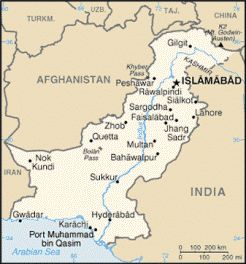By Shastri Ramachandaran* | IDN-InDepth NewsAnalysis
NEW DELHI (IDN) – Although the drawdown of NATO forces in Afghanistan is well under way, there remain many uncertainties about the post-2014 situation. The presence and role of the U.S. military and mercenaries, outcome of President Hamid Karzai’s endgames as he prepares the pitch for the presidential election in April 2014 and the consequences of the Taliban’s opposition to Pakistani Prime Minister Nawaz Sharif aiding the reconciliation process are just a few of the uncertainties.
In the event, the only certainty appears to be uncertainty over the peace-building process taking off as planned to bring about reconciliation and cooperation of those involved in Afghanistan. However, “reconciliation and cooperation of countries in the region” of South Asia refers not only to stabilization of the situation in Afghanistan for peace building, but is also a euphemism for India and Pakistan joining hands in and with Afghanistan.
Both India and Pakistan have high stakes and clear interests in Afghanistan, which place the latter firmly at the centre of cooperation. Both India and Pakistan want to maintain their political, economic and security presence in Afghanistan. The country being a hub of terrorist activities, India’s security interests demand that it ramp up not only its presence but also its capability to protect Indians, Indian missions, enterprises etc on a permanent basis. The attacks on Indians and Indian diplomatic missions and extremists from Afghanistan stoking the fires in Jammu and Kashmir make it necessary for New Delhi to devise ways of increasing its security.
Pakistan cannot countenance this as Afghanistan has always been vital – and is more so now – to Pakistan’s security. Pakistan also fears that under cover of reinforcing its security, India would strive to emerge as the pre-eminent political and economic power in Afghanistan; and, this is a pursuit that Pakistan has to thwart.
Given this rivalry between India and Pakistan, and their opposition to one gaining at the expense of the other in Afghanistan, trilateral cooperation would appear to be a chimera. Yet the benefits flowing from cooperation could be significant and substantial; and, serve their security as well as economic interests.
India would like to develop Afghanistan as a transit point between Central Asia and South Asia. For example, stability in Afghanistan can hasten the TAPI (Turkmenistan-Afghanistan-Pakistan- India) pipeline, and turn Pakistan into an energy grid that feeds the huge appetite of not only India but the whole of South Asia and China, too. Similarly, exploiting the potential of Gwadar port requires peace in the region, because events in Afghanistan have a cascading effect on Balochistan. The development of transit points, be it Afghanistan or Gwadar port in Pakistan, would be beneficial to India and Pakistan in particular and to South Asia in general.
Increased economic cooperation and trade would mean cheaper goods, new markets, better infrastructure, faster development, better flow and management of energy and more people traffic. These would raise the stakes for India, Pakistan and Afghanistan to join hands against common security threats such as terrorism, which affect all three countries.
Key to trilateral relations
Doubtless, the key to trilateral cooperation is improved bilateral relations between India and Pakistan. In the view of many informed and concerned sections worldwide, India-Pakistan hostility and one-upmanship is the single biggest obstacle to stabilising the situation in Afghanistan and creating the conditions for building peace in South Asia. While reconciliation can take long, cooperation in the region is a necessity that can no longer be put off in the interests of India, Pakistan and Afghanistan, and South Asia as a whole.
In Atal Bihari Vajpayee’s last months as Prime Minister and the early years of Manmohan Singh (2004-2006), there were a number of initiatives to take India-Pakistan relations to a new level. It is not just the mood and momentum of those years that need to be revived but also the spirit, resolve and understanding that characterised the diplomacy, dialogues, visits, meetings and agreements.
“Asia is a single organism and the Afghan nation is the heart of Asia since desire and courage spring from the heart”, said the famous philosopher-poet Sheikh Md Iqbal (perhaps in 1910). In his collection of Persian poems Payam-e-Mashriq (Message for the East), there is a memorable one on Afghanistan. It goes (in translation):
Asia is a body of water and clay,
Of which the Afghan nation forms the heart.
The whole of Asia is corrupt,
If the heart is corrupt,
Its decline is the decline of Asia;
Its rise is the rise of Asia,
The body is free only as long as the heart is free,
The heart dies with hatred but lives with faith.
*Shastri Ramachandaran is an independent political and foreign affairs commentator based in New Delhi. A former Director of the National Centre for Advocacy Studies in Pune, India, he is Member, Editorial Board, IDN-InDepthNews, and Advisor, Danish Cultural Institute, Copenhagen. He may be reached at: shastri.ramachandaran@gmail.com This article is based on his presentation at the China-South Asia Peace and Development Forum in Kunming, Yunnan Province, China on September 22, 2013. [IDN-InDepthNews – October 8, 2013]
2013 IDN-InDepthNews | Analysis That Matters
Shastri Ramachandran’s previous IDN articles:
http://www.indepthnews.info/index.php/search?searchword=shastri%20ramachndran&ordering=newest&searchphrase=any
Send your comment | Subscribe to IDN newsletter
Follow us on Twitter and Facebook:
http://twitter.com/InDepthNews
http://www.facebook.com/IDN.GoingDeeper

